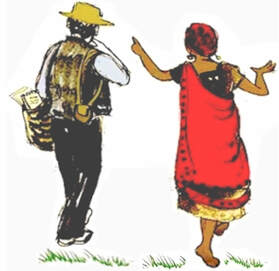Readings and Presentations |
|
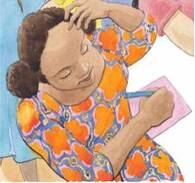
Outside Story Inside Story
The Power of Stories in Practices of Social Change By Doug Reeler, the Barefoot Guide Connection, 2023 “In a fractured age, when cynicism is god, here is a possible heresy: we live by stories, we also live in them. One way or another we are living the stories planted in us early or along the way, or we are also living the stories we planted — knowingly or unknowingly — in ourselves. We live stories that either give our lives meaning or negate it with meaninglessness. If we change the stories we live by, quite possibly we change our lives.” Ben Okri 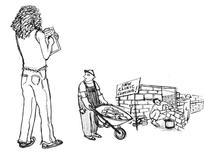
Supporting data
collection by the poor Data in the sphere of development has been effectively used for big picture questions like measuring levels of poverty and malnutrition or assessing the health and educational standards of a country or region’s population. For those of us who have been working on a smaller scale on issues like urban poverty, data about cities is very silent on issues related to poverty, slums and all forms of informality. Information is never accurate, it is always outdated, and it is seldom comprehensive. Often just a few informal settlements will be included. At the Society for the Promotion of Area Resource Centres (SPARC) and Slum Dwellers International (SDI), we have found that using the poor to collect and record data about themselves both develops their capabilities and produces better data. Sovereign local organisations and social movements
A Powerpoint presentation that argues for the importance of sovereign local organisations and social movements being at the centre of authentic approaches to social change. Handling Denial
This article examines how denial manifests in ‘game playing’ when people communicate with each other. This game playing leads to faulty communication and reinforces unhealthy patterns of communication. How can this be avoided? The article describes various approaches with concrete examples. 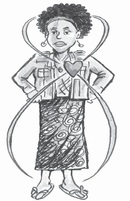
Developing Deep Listening Skills - an Exercise and a Reading
Being deeply listened-to is one of the most empowering experiences. This exercise teaches deep listening skills and can strengthen a listening culture. It can be used to surface and develop experiences and ideas in a workshop. The model used (head/heart/feet) is a powerful "archetype" that helps users to ask better questions when interviewing, surveying, diagnosing or counseling. This exercise includes a short reading on listening. Email the writer [email protected] The Three-fold Theory of Social Change - Implications for Practice, Planning, Monitoring and Evaluation
This paper puts forward a different theory of social change that goes beyond implicit conventional theories, providing a different framework for seeing and working with the complexities of change. "Most significantly, and ironically, the very Project approaches that donors insist be used for planning, monitoring and evaluating practice and impact, like Logical Framework Analysis and its cousins, have tacitly introduced a misleading and self-defeating theory of social change." Email the writer dou[email protected] Advanced Facilitation Skills Model
This reading explores the art of facilitation as essentially a process of leadership. A model of facilitation practice is offered which encompasses skills and an orientation for fairly advanced level of facilitation when working with groups and organisations. Story Telling – Getting to the heart of things
Stories have immense power and are able to communicate things that lie way beyond the spoken or printed words used to tell them. This article explores the magic of stories and story telling as well as their application in a developmental practice. Email the writer [email protected] Approaching Evaluation
Developmentally Slow down and enjoy life. It is not only the scenery you miss by going too fast – you also miss the sense of where you are going and why. E. Cantor Evaluation done in a developmental way can unlock potential for learning and improved practice, yet we struggle to make evaluation the vehicle for positive change in development. This article explores the elements that will enhance the role of evaluation in our work. 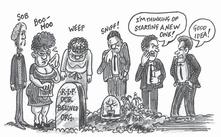
A 'Good Death’ - In search of developmental endings
The idea of death, the coming to an end of a life, a relationship or even an organisation is something that is often hard for us to face. This article reframes the notion of death, and sees it as an inextricable part of development out of which can emerge the promise of renewal and change. Barriers, Will and Resistance to Change
What makes change difficult? What prevents individuals, organisations or communities from moving ahead? This article goes some way in answering these questions, but also attempts to provide some practical advice on how to deal with the critical challenges that go with the process of change. The Arrogance of Giving
by Rubert van Blerk of the CDRA Giving and receiving are at the heart of human transactions within our sector and is characterised by much difficulty and frustration, despite the positive intentions to facilitate development. The article attempts to unpack the notion of giving and alerts us to some interesting challenges in our work. 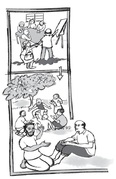
Exploring the Unique Roles of NGOs - A role play exercise
Enabling participants within an NGO or on a course to understand the unique nature and work of NGOs as civil-society actors. It will help people to think about the work, relationships and organisation as well as some of the primary questions and tensions faced by NGOs and practitioners. |
Barefoot Guide 2 Action Research - The Heart of Organisational Learning
Findings of an action research on organisational learning practices This document shares our questions, and our key findings from the year-long Action Research programme linked to the publication of the Barefoot Guide 2, with 43 organisations from 3 continents. It also gives an account of the action research process we followed, for action research itself, which we discovered was itself is a remarkable learning process. Child-centred Development:
The basis for sustainable human development Published by Unicef, 2003 A powerful argument for centering sustainable development efforts around the needs and rights of children. "Children bear a disproportionate burden of poverty and a denial of their rights. No other age group is more likely to live in poverty. A child born today in the developing world has a 4 out of 10 chance of living in extreme poverty. The worst manifestations of poverty and lack of development can be eradicated in less than a generation. Taking a child-centered approach is essential to breaking these cycles of denial that restrict children’s capabilities and potential. It is the only way to address patterns of illhealth, inadequate nutrition and the limitations of poor or no education. It is the foundation for all nation building." (pages 2-3) 
Bringing discipline and rigour to organisational learning
by Eunice Agbneyadzi and Nomvula Dlamini Many organisations claim to be learning entities. But, on a closer look we see the focus tends to be on learning activities. While such activities may have value, over time, people in organisations lose interest and begin to question their usefulness. This piece explores approaches to facing this to enable sustained and sustainable learning in organisations. Email the writers [email protected] or [email protected] Communities of Practice
By Tracey Martin A thought-piece based on the Barefoot Guide 2 Action Research Reports of South East Asia, South Asia, Southern Africa, East Africa, West & Central Africa and Europe. Leadership for Learning
by Jacqueline Verhagen A look at what kind of positive leadership for learning helps an'd what kind of leadership involvement is needed to have an action research which can contribute to organisational learning and social change. Single, Double and Triple Loops of Learning
Do you struggle to grasp just what the concept of "single and double loop learning" is? Well here is another loop to consider, but all simply explained to help you to better design your learning interventions. The concepts are largely from the works of Argyris and Schon (1974). The Four Temperaments
A Powerpoint Presentation 
Using Emergence to Take Social Innovations to Scale
by Margaret Wheatley and Deborah Frieze In spite of current ads and slogans, the world doesn't change one person at a time. It changes as networks of relationships form among people who discover they share a common cause and vision of what's possible. This is good news for those of us intent on changing the world and creating a positive future. Rather than worry about critical mass, our work is to foster critical connections. We don't need to convince large numbers of people to change; instead, we need to connect with kindred spirits. Through these relationships, we will develop the new knowledge, practices, courage, and commitment that lead to broad-based change... From Learning Together To Working Together - Mobilising Rural Caregivers In South Africa To Engage Government Co-Creatively
Almost six years ago, 18 South African NGOs all working on early childhood development formed a learning alliance. Over the years they have established a collaborative learning and working platform, involving organised community-based women caregivers, to develop workable and sustainable solutions for the well-being of young children in South Africa. This is their story. Who asked you anyway?
Some feedback on "feedback" Feedback may say more about the relationship between the giver and the receiver than what has been observed or interpreted. Sue describes some of the pitfalls associated with feedback and offers some suggestions. 
The Five Bases of Power
Social psychologists French and Raven, in a now-classic study (1959), developed a schema of five bases of power which reflect the different bases or resources that power holders rely upon in their relationships with others. Often our power is based on different combinations of these. They are: Positional Power, Reward Power, Personal Power, Expert Power and Coercive Power. An extract from Barefoot Guide to Working with Organisations and Social Change. The Ten Commandments for facilitators of organisation capacity building
The pressures to quickfix make us forget about some of the fundamentals of what is empowering and what is not. This is just a short reminder of how to avoid the temptations of the easy-ways-out. Great also for a training course or team discussion to discuss some if the fundamentals of a developmental approach. |
